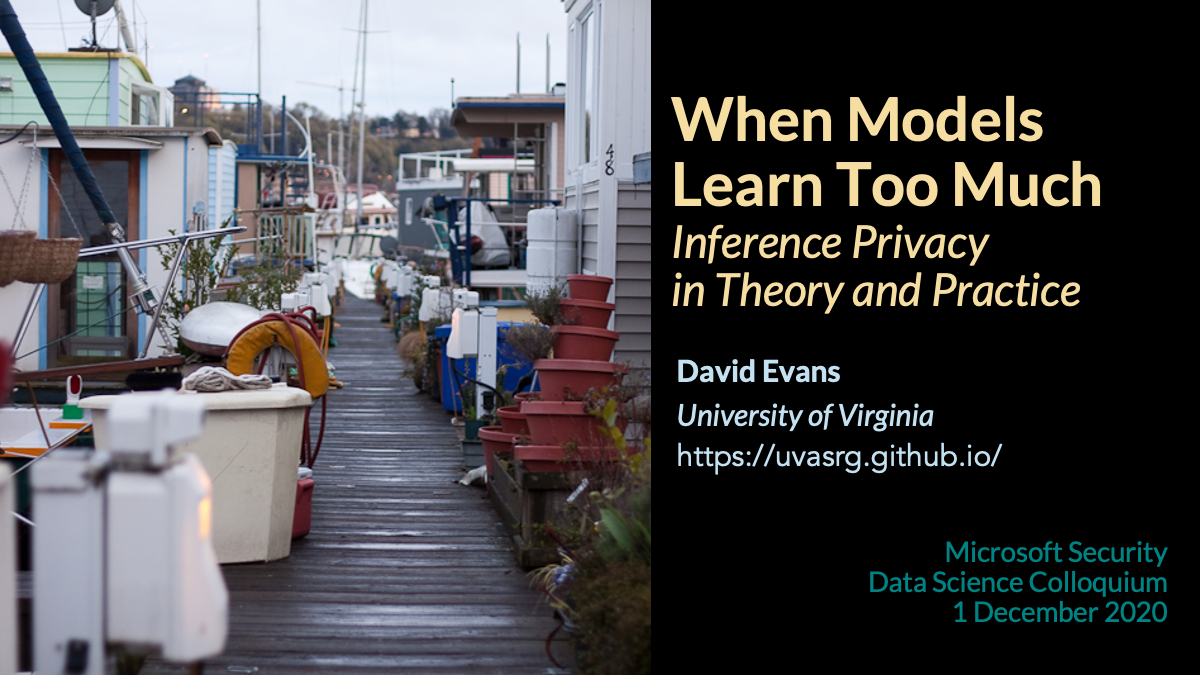Virginia Consumer Data Protection Act
Josephine Lamp presented on the new data privacy law that is pending in Virginia (it still needs a few steps including expected signing by governor, but likely to go into effect Jan 1, 2023): Slides (PDF)
This article provides a summary of the law: Virginia Passes Consumer Privacy Law; Other States May Follow, National Law Review, 17 February 2021.
The law itself is here: SB 1392: Consumer Data Protection Act
Algorithmic Accountability and the Law
Brink News (a publication of The Atlantic) published an essay I co-authored with Tom Nachbar (UVA Law School) on how the law views algorithmic accountability and the limits of what measures are permitted under the law to adjust algorithms to counter inequity:
Tom Nachbar and David Evans
Brink, 7 December 2020
Computing systems that are found to discriminate on prohibited bases, such as race or sex, are no longer surprising. We’ve seen hiring systems that discriminate against women image systems that are prone to cropping out dark-colored faces and credit scoring systems that discriminate against minorities.
Microsoft Security Data Science Colloquium: Inference Privacy in Theory and Practice
Here are the slides for my talk at the Microsoft Security Data Science Colloquium:
When Models Learn Too Much: Inference Privacy in Theory and Practice [PDF]

The talk is mostly about Bargav Jayaraman’s work (with Katherine Knipmeyer, Lingxiao Wang, and Quanquan Gu) on evaluating privacy:
- Merlin, Morgan, and the Importance of Thresholds and Priors
- Evaluating Differentially Private Machine Learning in Practice
Fact-checking Donald Trump’s tweet firing Christopher Krebs
I was a source for thie “Pants on Fire!” fact check by PolitiFact on Donald Trump’s tweet that fired Christopher Krebs claiming that “The recent statement by Chris Krebs on the security of the 2020 Election was highly inaccurate, in that there were massive improprieties and fraud - including dead people voting, Poll Watchers not allowed into polling locations, “glitches” in the voting machines which changed…”

PolitiFact: Fact-checking Donald Trump’s tweet firing Christopher Krebs, 18 November 2020
Voting Security
I was interviewed for a local news story by Daniel Grimes on election security: UVA cybersecurity expert: Virginia is one of the safer states to cast a ballot, NBC 29 News, 21 October 2020.
Merlin, Morgan, and the Importance of Thresholds and Priors
Post by Katherine Knipmeyer
Machine learning poses a substantial risk that adversaries will be able to discover information that the model does not intend to reveal. One set of methods by which consumers can learn this sensitive information, known broadly as membership inference attacks, predicts whether or not a query record belongs to the training set. A basic membership inference attack involves an attacker with a given record and black-box access to a model who tries to determine whether said record was a member of the model’s training set.
Adversarially Robust Representations
Post by Sicheng Zhu
With the rapid development of deep learning and the explosive growth of unlabeled data, representation learning is becoming increasingly important. It has made impressive applications such as pre-trained language models (e.g., BERT and GPT-3).
Popular as it is, representation learning raises concerns about the robustness of learned representations under adversarial settings. For example, how can we compare the robustness to different representations, and how can we build representations that enable robust downstream classifiers?
Intrinsic Robustness using Conditional GANs
The video of Xiao’s presentation for AISTATS 2020 is now available: Understanding the Intrinsic Robustness of Image Distributions using Conditional Generative Models
Starting with Gilmer et al. (2018), several works have demonstrated the inevitability of adversarial examples based on different assumptions about the underlying input probability space. It remains unclear, however, whether these results apply to natural image distributions. In this work, we assume the underlying data distribution is captured by some conditional generative model, and prove intrinsic robustness bounds for a general class of classifiers, which solves an open problem in Fawzi et al. (2018). Building upon the state-of-the-art conditional generative models, we study the intrinsic robustness of two common image benchmarks under l2 perturbations, and show the existence of a large gap between the robustness limits implied by our theory and the adversarial robustness achieved by current state-of-the-art robust models.
Hybrid Batch Attacks at USENIX Security 2020
Here’s the video for Suya’s presentation on Hybrid Batch Attacks at USENIX Security 2020:
Download Video [mp4]
Blog Post
Paper: [PDF] [arXiv]
Pointwise Paraphrase Appraisal is Potentially Problematic
Hannah Chen presented her paper on Pointwise Paraphrase Appraisal is Potentially Problematic at the ACL 2020 Student Research Workshop:
The prevailing approach for training and evaluating paraphrase identification models is constructed as a binary classification problem: the model is given a pair of sentences, and is judged by how accurately it classifies pairs as either paraphrases or non-paraphrases. This pointwise-based evaluation method does not match well the objective of most real world applications, so the goal of our work is to understand how models which perform well under pointwise evaluation may fail in practice and find better methods for evaluating paraphrase identification models. As a first step towards that goal, we show that although the standard way of fine-tuning BERT for paraphrase identification by pairing two sentences as one sequence results in a model with state-of-the-art performance, that model may perform poorly on simple tasks like identifying pairs with two identical sentences. Moreover, we show that these models may even predict a pair of randomly-selected sentences with higher paraphrase score than a pair of identical ones.